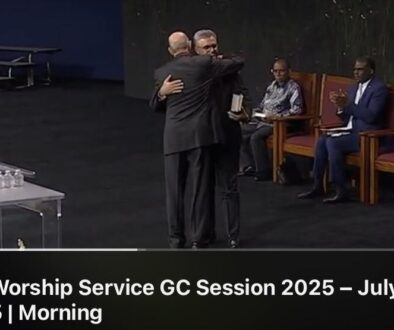Noted Adventist Physician Challenged at Emory University on His Belief in Creation
by AT News Team
Dr. Ben Carson is the commencement speaker at Emory University in the suburbs of Atlanta this weekend. More than 150 faculty members have signed a letter published in the campus newspaper objecting to Carson’s belief in creation as stated in an interview in the Adventist Review.
Emory is a leading research university and Carson is the renowned pediatric neurosurgeon and faculty member at Johns Hopkins University in Baltimore. He is one of the most well-known Seventh-day Adventists in America.
“Dr. Carson insists on not seeing a difference between science, which is predictive and falsifiable, and religious belief systems, which by their very nature cannot be falsified,” the letter states. “His great achievements in medicine allow him to be viewed as someone who ‘understands science.’ [But,] the work of Dr. Carson is based on scientific advances fostered by an understanding of evolution.”
The letter argues that “accepting evolution, and the scientific method in general, are not at odds with being moral or religious” and cites Dr. Francis Collins, a Christian who serves as director of the National Institutes of Health, and former U.S. President Jimmy Carter, an engineer by education who for many years taught a Sunday School class at his local Baptist church. It states that Carson “equates the acceptance of evolution with a lack of ethics and morality” referencing the Adventist Review interview.
Carson has told the Washington Post that “he does not think evolutionists are unethical” and the Review did not publish his complete quote. Carson was making a point common among Christian critiques of evolution that it does not have the same foundation for moral principles as does a belief in the Bible as the word of God. “A lot of evolutionists are very ethical people,” he is quoted in the Post of May 8.
Princeton University philosopher Robbie George wrote about Carson's views on the web site First Things, "He doesn't believe that his Darwinist friends and colleagues are ncessarily unethical. What he believes is that Darwinism is necessarily materialistic … a view [shared by] some devout Darwinists themselves. And he believes that materialism, if true, is incompatible with free will and with ethical norms. … He knows perfectly well that people who believe in materialism are in many cases decent, honorable, ethical people. But he thinks that they lead lives that are much better than their formal philosophical beliefs would require them to lead. He believes that their commitment to materialism makes it impossible for them to give a sound account of the ethical norms which they themselves, to their credit, live by." It is unclear if George spoke with Carson or is simply describing what he sees as shared beliefs.
Carson has not hid his views on this topic, the Post points out in a column by higher education reporter Valerie Stauss. He once told a National Science Teachers convention, “Evolution and creationism both require faith. It’s just a matter of where you choose to place that faith,” the newspaper reports. “We ask you to also consider the enormous positive impact of science on our lives,” the letter published in The Emory Wheel states, “and how that science rests squarely on the shoulders of evolution.” It argues that “the theory of evolution is as strongly supported as the theory of gravity and the theory that infectious diseases are caused by micro-organisms.”
Carson has given addresses and received honorary degrees at scores of major universities and this is “the first time that his views on evolution have become an issue,” according to the Post. He may have become a target of “atheist fundamentalism,” one Adventist academic told Adventist Today. In 2000 Caron was awarded the highest civilian honor in the United States, the Presidential Medal of Freedom. He became widely known in 1987 when he was the first surgeon to successfully separate twin babies conjoined at the head.
The inspirational story of Carson’s childhood with a single mother in the inner city of Detroit who almost dropped out of school has been told in books and a television movie starring Cuba Gooding Jr. He attributes his eventual success in life to the Adventist faith he learned from his mother. He is active in philanthropy and his local church where he co-led a Sabbath School class for many years.



